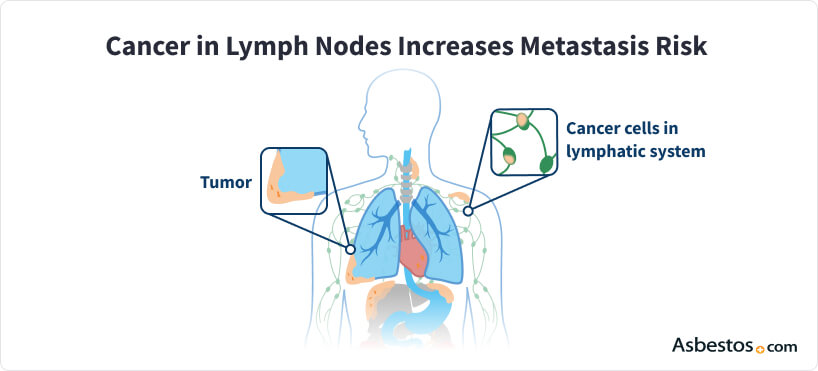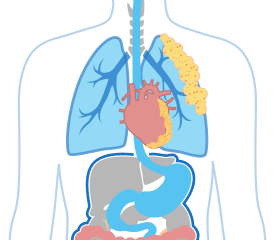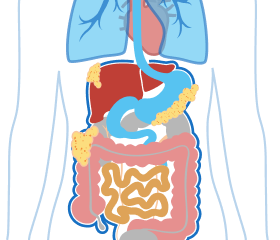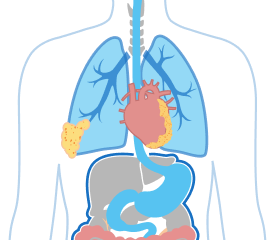When Russell Lamkin was first diagnosed with stage 3 mesothelioma, he was told it was inoperable and his life expectancy was about a year. He was then able to find success participating in a transarterial chemoperfusion study at the Moffitt Cancer Center in Tampa. Russell says, “My neighbors don’t even know I’m sick. I still look and feel pretty good.”
Stage 3 Mesothelioma
Stage 3 mesothelioma is an advanced stage of this rare cancer. During this stage, tumors have spread to nearby lymph nodes, organs and tissues. The median life expectancy for stage 3 mesothelioma patients ranges from 16 to 26 months. Treatments such as surgery, chemotherapy and radiation can improve survival rates.
What Is Stage 3 Mesothelioma?
Stage 3 mesothelioma is the second to last stage of mesothelioma cancer. Tumors have spread beyond their point of origin to other areas. In stage 3 pleural mesothelioma, tumors have spread throughout the lining of the lungs on one side of the chest. They have also spread to the centralized glands, known as the mediastinal lymph nodes.
Pleural stage 3 tumors can affect nearby structures such as the diaphragm and heart sac. They can also grow on the chest wall and central chest region between the lungs. This area is known as the mediastinum.
Other forms of mesothelioma cancer occur in different areas. Peritoneal mesothelioma, which affects the abdomen, doesn’t have an official staging system. Doctors use an existing indexing tool to help stage peritoneal mesothelioma. Using that system, stage 3 peritoneal tumors are in the peritoneal lining and nearby lymph nodes.
Key Facts About Stage 3 Mesothelioma
- The 5-year survival rate at stage 3 for peritoneal mesothelioma is 29%.
- The 5-year survival rate at stage 3 for pleural mesothelioma is about 16%.
- Tumor-removing surgery is still a possibility in stage 3 for some patients.
- Emerging treatments through clinical trials may extend survival.
- About 25% of pleural patients get diagnosed at stage 3 according to the U.S. Cancer Statistics Working Group.

Understand your diagnosis, top doctors and ways to afford care.
Get Your Free GuideStage 3 Mesothelioma Symptoms
Stage 3 mesothelioma symptoms may include shortness of breath, fever or fatigue. Symptoms may become more noticeable than in stage 2 mesothelioma, but any symptoms before stage 3 are generally rare.
Symptoms and characteristics in stage 3 can vary between patients depending on where the cancer spreads and if it damages organs. As tumors grow and spread throughout the chest or abdomen, symptoms worsen.
Stage 3 Mesothelioma Symptoms
- Fatigue
- Fever
- Fluid buildup
- Gastrointestinal problems
- Pain in the chest or abdomen
- Recurring dry cough
- Shortness of breath
- Weight loss
Pleural mesothelioma tumors cause increased pleural fluid. This puts pressure on the lungs. Peritoneal mesothelioma tumors cause peritoneal fluid buildup, places stress on the abdomen.
Some patients may experience referred pain in the neck, back or shoulders. Pleural tumors may cause chest pain and breathing difficulties. Peritoneal tumors may cause bloating, constipation and diarrhea.
Stage 3 Mesothelioma Life Expectancy and Prognosis
Stage 3 mesothelioma life expectancy ranges from 16 to 26 months. A patient’s medical history, health and treatment all impact life expectancy.
The prognosis is your doctor’s estimate of how mesothelioma will affect you and how it will respond to treatment. Mesothelioma life expectancy and prognosis can improve after trying an effective therapy.
When I was first diagnosed with stage 3 inoperable mesothelioma and told I had a year to live, I figured I’d better hurry up and finish projects I was working on. But now my goal is to make it to the 10-year mark.
Some patients live for many years with successful treatment. Survival statistics don’t apply to everyone and can’t predict an individual’s prognosis.
Survival rates are not the only indicators of a mesothelioma patient’s prognosis. Age, gender, cancer cell type, response to treatment and general health affect survival. Surgery and other therapies may help patients live past the typical prognosis.
Mesothelioma Stage 3 Survival Rates
About 16% of stage 3 pleural patients live 5 years after diagnosis. Roughly 29% of stage 3 peritoneal patients live at least 5 years.
Median survival refers to the length of time that half of patients are expected to live after diagnosis. It represents the midpoint, where half of the patients live longer than the median, and the other half live for a shorter duration.
| 2-Year Survival Rate of All Stages | 5-Year Survival Rate at Stage 3 | Median Survival | |
|---|---|---|---|
| Pleural Mesothelioma | 22% | 16% | 16 months |
| Peritoneal Mesothelioma | 35% | 29% | 26 months |
Patients with late-stage testicular mesothelioma have a median survival of about 2 years. Late-stage pericardial mesothelioma patients live around 10 months. Some live longer after surgery or chemotherapy.
How Lymph Nodes Affect Mesothelioma Life Expectancy
The body’s lymph nodes play a role in the spread of cancer. Cancer cells in lymph nodes can condition immune cells to protect cancer rather than attack it. This factor contributes to metastasis, or the spread of cancer throughout the body. After spreading surgery is no longer helpful. Early treatment can limit the spread of cancer and extend life expectancy.

Patients with stage 3 mesothelioma can have varying degrees of lymph node involvement. Patients with more cancerous lymph nodes have a life expectancy of about 13 months.
Surgery may not be an option for all stage 3 patients. Patients with more progressed stage 3, or stage 3B, may have tumors in the diaphragm or heart sac. In this case, surgery is not a viable option.
How Is Stage 3 Mesothelioma Treated?
A multimodal treatment plan uses surgery, chemotherapy and radiation. It has produced the best survival rates for people with stage 3 pleural mesothelioma. Stage 3 tumors grow and spread quickly, but removal may be possible. Extensive surgery and aggressive mesothelioma treatment provide benefits in specific circumstances.
Not all stage 3 mesothelioma patients can have aggressive surgery. However, they can still get immunotherapy, chemotherapy and treatments to ease symptoms. They might also join clinical trials for new therapies.
Most Common Treatment Options for Stage 3 Mesothelioma
Stage 3 treatment varies based on cancer growth and personal factors such as age and health. Patients with stage 3A may get more aggressive treatment than those with stage 3B because their cancer is less advanced.
Treatment Options for Stage 3 Mesothelioma
- Chemotherapy: Most patients receive 2 chemotherapy drugs via IV. Some patients get intracavitary therapy, which injects chemotherapy into specific areas of the body.
- Immunotherapy: The FDA in 2020 approved Opdivo (nivolumab) and Yervoy (ipilimumab) to treat pleural cases. It also approved Keytruda (pembrolizumab) with chemo for pleural cases in 2024.
- Palliative Care: This type of care uses medication, therapy and procedures to control the symptoms of mesothelioma and improve quality of life.
- Radiation Therapy: Radiation for stage 3 pleural patients helps pain related to their cancer. Patients who qualify for multimodal therapy receive radiation to prevent recurrence.
- Surgery: Surgery for stage 3 pleural cases may be palliative. But some patients qualify for aggressive surgery. Stage 3 peritoneal patients may receive tumor removal surgery (cytoreductive surgery) with heated chemotherapy.
- Targeted Therapy: Treatments sometimes combine the targeted drug Avastin (bevacizumab) with chemotherapy to extend survival.
- Tumor Treating Fields: This therapy uses alternating electric fields and chemotherapy to control tumor growth.
Treatment options are more limited than in earlier mesothelioma stages. Surgery is possible but less likely to be successful for advanced cases.
Mesothelioma clinical trials give hope to stage 3 patients who can’t have surgery. They offer new treatments that might improve prognosis and life expectancy. Patients should talk to their doctors about clinical trials in their area.

Connect with trusted specialists who truly care about your health. Get fast, stress-free appointment help.
Find a Doctor NowCharacteristics of Stage 3 Mesothelioma by Type
Characteristics of stage 3 mesothelioma include localized tumors and tumor spread to distant lymph nodes. Different staging systems use additional features to define the respective stages.
Only pleural mesothelioma has an official staging system. In 2011, researchers suggested a staging system for peritoneal mesothelioma using lymph nodes, metastasis and the existing Peritoneal Cancer Index. This index measures cancer on the peritoneal lining of the abdomen. The system hasn’t been approved yet for peritoneal mesothelioma. Doctors need data from more patients to confirm its accuracy.
Stage 3 symptoms are more severe than stage 2. Patients have fewer treatment options and cancer has invaded nearby tissues and organs. Compared to stage 4, tumors haven’t yet metastasized to distant areas of the body. Many therapies, such as immunotherapy, chemotherapy and radiation, can limit metastasis, extend survival and control pain.
“When I diagnose a patient with stage 3 peritoneal mesothelioma, it typically means the cancer has spread across the abdominal lining and into nearby lymph nodes. I’ve seen how this stage can significantly limit treatment options, which is why early detection is crucial.”
What to Do After a Stage 3 Mesothelioma Diagnosis
After receiving a stage 3 mesothelioma diagnosis, find a doctor who specializes in this cancer. Seek treatment as soon as possible following a stage 3 mesothelioma diagnosis.
Working with experienced mesothelioma doctors gives you the best chance of improving your prognosis. Improving health through nutrition and exercise may help extend your life expectancy.
Not all hospitals or major metropolitan cancer centers have doctors focusing on mesothelioma. Joining a mesothelioma support group is a great way to build a network of information. You can learn about clinical trials and physicians specializing in this rare cancer.
Mesothelioma support groups help patients come to terms with their diagnosis. They often provide resources for improving quality of life and mental health.
Common Questions About Stage 3 Mesothelioma
- Is stage 3 pleural mesothelioma curable?
-
There is no mesothelioma cure for any stage of the disease. A small number of stage 3 patients are eligible for surgery, which may significantly extend survival.
- What are the most common symptoms of stage 3 mesothelioma?
-
Symptoms of stage 3 mesothelioma may include shortness of breath, pain in the chest or abdomen, dry cough and fatigue.
- How can stage 3 life expectancy be improved?
-
There are a number of factors affecting mesothelioma life expectancy in stage 3.
- Age, gender and overall health
- Cancer stage and cell type
- Mesothelioma treatment response
Lifestyle changes, like diet and exercise, can help stage 3 mesothelioma patients. They may extend survival for those on chemotherapy, immunotherapy or other treatments.
- Are stage 3 mesothelioma patients eligible for clinical trials?
-
Many cancer centers in the United States offer clinical trials for stage 3 mesothelioma patients. They test new drugs and innovative therapy combinations.












